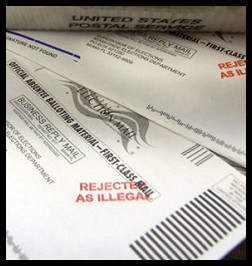Meep! Second serious post in a row, but
accessibility law is important, right? And this one in particular is
controversial, too, because it potentially affects not just the
disabled community, but the entire country. It's about...[cue
dramatic music]...voting.
The debate over whether Americans
should be allowed to vote through the internet is not exactly fresh.
There are those, namely voting system manufacturers, who claim its
inevitability and modernity and those who counter, arguing that
wide-scale fraud would abound. Recently, though, the debate has
turned from a back-and-forth between convenience and security to a
civil rights issue.
The focus is on Maryland, where the
debate is whether or not the state board of elections must certify
internet-based delivery and marking of absentee ballots for members
of the disabled community. The plaintiffs are the National Federation for the Blind (NFB), a man with cerebral palsy, and a woman
who is deaf and blind.
Maryland's proposed system is not
internet voting to the fullest extent; rather, it allows absentee
voters to get their ballots online and mark them through an
internet-connected browser window that communicates with the county
election office's servers. Then they would also have to print the
ballot, sign and mail it. It's a similar system to what overseas and
military voters currently use. As of 2012, too, all voters in Alaska
have had the option to vote electronically.
 Those who use forms of electronic
voting systems currently represent a small portion of voters.
Opponents are concerned that, should the lawsuit succeed, a national
precedent will be set, and everyone will be able to vote online.
This, they say, would mean exposing a vast number of voters to
compromised security and privacy.
Those who use forms of electronic
voting systems currently represent a small portion of voters.
Opponents are concerned that, should the lawsuit succeed, a national
precedent will be set, and everyone will be able to vote online.
This, they say, would mean exposing a vast number of voters to
compromised security and privacy.
However, members of the disabled
community know quite a bit about compromised security and privacy
when voting. Polling booths are required to have accessibility
features that allow visually impaired voters to listen to
instructions and choices, but poll workers are often untrained in these
features, and volume and clarity can be problematic. Blind absentee
voters tend to have to go to elections offices and trust an election
worker to fill out the ballot accurately and faithfully. Further,
there does not currently exist a polling system that allows the
deaf-blind or those with motor skill impairments to vote
independently.
“People without disabilities take it
for granted being able to vote privately or independently,” says
Lou Ann Blake, the Help America Act project coordinator for the NFB.
“That's not something the blind person can do absentee. Even if
it's a family member helping them, that can be an awkward situation.
I want to be able to vote privately and independently absentee like
everybody else. I don't think that's an irrational expectation.”
Still, widespread security is a major
concern for many voters. Security is an issue even with paper
ballots, but e-voting opponents say that those risks are minor
compared to those posed by online voting. In particular, online
voting increases the population of potential (anonymous and possibly
remote) saboteurs and their methods of vote-rigging.
What do you think? Both sides have
valid points. Share your thoughts!
(Also, if you want to read more, click here!)




No comments:
Post a Comment